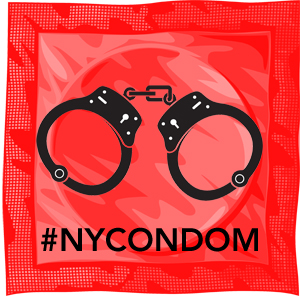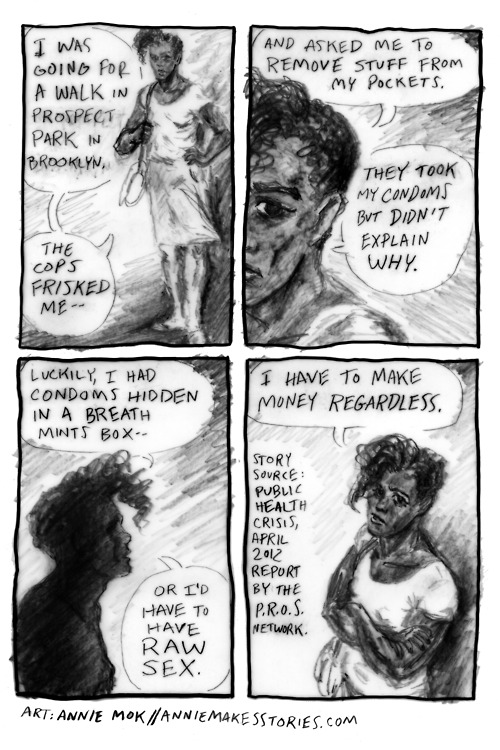
I’m a community organizer for Red Umbrella Project, and for the past year and a half I’ve been one of the leaders in the struggle to ban the use of condoms as evidence of all prostitution-related offenses in New York. We recently had a great victory in this campaign with a NYPD directive issued that bans the use of condoms for three misdemeanor offenses: prostitution, loitering for the purposes of prostitution, and prostitution in a school zone. Unfortunately that still excludes most prostitution-related offenses which, while targeted at clients, managers of the sex trades, and human sex traffickers, all too often are an initial charge filed against those doing sex work, especially transgender women of color. So our battle continues. But I feel it is important to clarify for people in the sex trades around the world why it is that we as a peer-led group by and for people in the sex trades place such great importance in this issue. While some may say that advocacy of any goal short of the decriminalization of all prostitution laws is selling out, the decriminalization of condoms opens the door for greater possibilities in organizing around other decrim efforts both in New York and elsewhere.
Handcuffs empower no one. Red Umbrella Project knows, from the arrests and incarcerations of our comrades, family, and friends, that the criminal justice system is toxic to the lives of people in the sex trades, especially those most marginalized within it. All too often sex work criminalization goes hand-in-hand with the criminalization of trans women and queer youth of color, undocumented people, and low-income women of color. Believing strongly that a peer-led model personally empowers the lives of people in ways that even the most progressive justice system cannot, we oppose the tearing apart of our communities by arrest and incarceration.
I love history, by which I mean I love the in-depth meticulous detailing you see in accounts such as Mindy Chateauvert’s account of the sex workers’ rights movement, Sex Workers Unite. What I dislike is how the way history is generally discussed and taught is individualistic and decontextualized. Rosa Parks didn’t organize the Montgomery Bus Boycott singlehandedly and neither did NAACP: she was one very charismatic leader in a coalition movement mostly made up of Black domestic working women. Further, this was a bus boycott in a sea of escalating bus boycotts that had taken place for the past forty plus years throughout the South. Tactics were learned, organizations established and expanded, and media was exposed to the growing reality of desegregation. I would like to hear of a single moment in which radical socio-economic change occurred spontaneously. As one of the original supporters of Occupy Wall Street, someone involved with Adbusters and other foundational groups prior to when the occupation even started, I know from personal experience that this is true. And with that experience, I decided to join Red Umbrella Project because they were building towards comprehensive change through coalition building against criminalization.

But this system of criminalization is one of the most powerful governmental institutions in the world. And the co-option of our movements has severely debilitated our ability to press for the fullest extent of our demands. Further criminalization directly affects groups that work with sex workers because of an assortment of felony and misdemeanor crimes known as pandering or promoting prostitution. Advocates and community outreach workers can be charged with these crimes for activities like giving a sex worker a condom, letting a sex worker borrow a phone, or even giving a homeless sex worker a place to live: “…someone could be arrested for these felonies – which seemed possible with revelations about the FBI’s Counter-Intelligence Program (COINTELPRO) – forced [American sex worker rights groups] to review its programs. The chilling effect nixed some organizing projects and services for hookers to help hookers” (Sex Workers Unite, pg 77). We need to build a movement and often times we need to build one from scratch: one only needs to look at the age of groups like Red UP and SWOP (three years and 11 years old, respectively). Compare that to the age of the NAACP and Rosa Parks’s years of involvement in activism at the time of the Montgomery Bus Boycott (46 years and 12 years). This is not to say that we cannot do important or militant work until we have more experience. We don’t have to reach for low-hanging fruit, but there’s no point in focusing on getting to the top of the tree before we’ve built a ladder. Because the largest obstacles are like brick walls: you can’t knock it down with a firehose, even one that is really powerful. Only a tidal wave will smash it to bits. We want comprehensive decriminalization for our members and all people in the sex trades, and fighting against the practice of using condoms as evidence is planting the seeds of those future struggles.
That tidal wave cannot and will not be an effort solely by sex workers. It’s great that socio-economic justice groups have become wary of allies, because they are all too often worthy of the caution, but disliking and disagreeing with a group doesn’t mean that you cannot work with them. Critical mass on sex worker issues will only come with alliances. The condoms as evidence campaign is a symbol of broader policing and safety issues sex workers face, and it is part of a long term strategy to build coalitions with non-sex worker groups. These coalitions will allow us audiences and platforms that we could not reach alone. And these groups aren’t necessarily all big name non-profits: we certainly are not the first group to see the commonalities between sex workers and domestic workers, sex workers and food service workers, and sex workers and nurses.
The decriminalization of condoms with all prostitution-related offenses grants a degree of human dignity to people in the sex trades that they are currently deprived of. It is a pragmatic but militant goal for people in the sex trades in New York.
2 comments